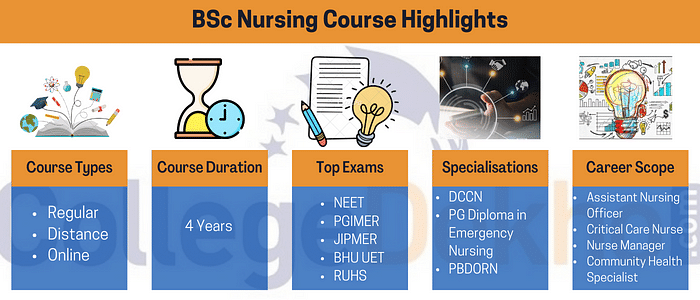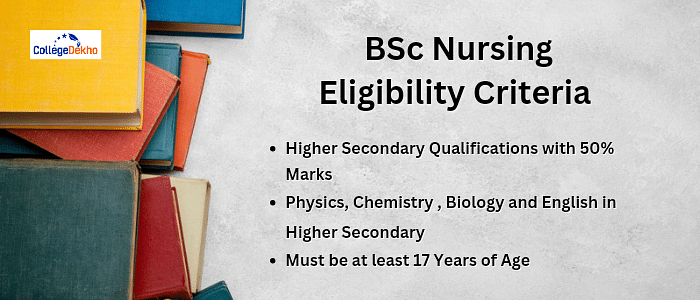BSc Nursing
BSc Nursing is a 4-year long UG course that trains students on the roles and responsibilities of a Nursing professional. Aspirants can either directly apply for a BSc Nursing Course admission after their 10+2 or complete a Diploma in Nursing degree to apply for BSc Nursing admission. Candidates need to have studied English, Chemistry, Biology, and Physics as core subjects in their 10+2, to be eligible for pursuing a BSc Nursing course.
What is BSc Nursing?
BSc Nursing or Bachelor of Science in Nursing is a 4-year undergraduate course in the field of Medical Science through which students learn how use medical treatments to aid others and treat ailments. To meet the minimum eligibility criteria for admission to BSc Nursing, students must obtain a higher secondary degree with at least 50% marks in the science stream with English, Chemistry, Biology, and Physics as core subjects. Another way to apply for a BSc Nursing degree is to complete a Diploma in Nursing. Along with imparting knowledge to students on critical care and advanced analytical skills, a BSc Nursing course also helps them inculcate values that are necessary for becoming professional nurses.
There are more than 1,00,000 Nursing colleges in India that offer various degrees to students interested in this field. Aspirants can pursue a BSc Nursing degree in either of the three modes: online, offline, and through distance learning. BSc Nursing Syllabus covers a detailed course structure including topics related to the human body such as Anatomy, Physiology, Biochemistry, Psychology, Nutrition and Dietetics, etc. BSc Nursing Admission Process is conducted through major entrance exams such as NEET, AIIMS Nursing Exam, JENPAS, etc. Admission to BSc Nursing is also done through some individual state conducted native nursing entrance exams for prestigious institutions.
The BSc Nursing course fee in India is usually within the range of INR 10,000 to INR 2 LPA, depending upon the type of institution. Students who complete a BSc in Nursing degree have a wide scope of career avenues that they can embark upon. Some of the most popular BSc Nursing jobs include the roles of a clinical nurse specialist, certified nurse midwife, case manager, nurse anaesthetist, nurse educator, nurse practitioner, or staff nurse. Among the top BSc Nursing colleges in India are AIIMS New Delhi, PGIMER Chandigarh, CMC Vellore, BHU, etc. The average BSc Nursing Salary may range from INR 2 LPA to INR 12 LPA based on a number of factors.
Table of Contents
- What is BSc Nursing?
- BSc Nursing Course Highlights
- Why Study BSc Nursing?
- BSc Nursing Eligibility Criteria
- Popular BSc Nursing Courses and Specializations
- Types of BSc Nursing Courses
- BSc Nursing Entrance Exams
- BSc Nursing Admission Process
- BSc Nursing Scholarships in India
- BSc Nursing Course Syllabus
- BSc Nursing Course Comparison
- BSc Nursing Course Fee
- Top BSc Nursing Colleges in India
- City-Wise BSc Nursing Colleges in India
- Top Government BSc Nursing Colleges in India
- Top Private BSc Nursing Colleges in India
- Courses After BSc Nursing
- Career Options after BSc Nursing
- BSc Nursing Salary in India
- FAQs about BSc Nursing
BSc Nursing Course Highlights
A BSc Nursing degree can propel a student’s career in the right direction. Check out the important highlights of BSc Nursing course in India.

| Particular | Detail |
|---|---|
| Course Name | BSc in Nursing |
| Course Level | Undergraduate (UG) |
| Course Duration | 4 Years |
| Eligibility Criteria | 10+2 with Physics, Chemistry and Biology as compulsory subjects |
| Admission Process | Through Entrance Exams followed by Counselling Process |
| Entrance Exams |
|
| Course Fee | INR 10,000 - 2,00,000 per annum |
| Top Colleges |
|
| Average Salary | INR 3 LPA - INR 10 LPA |
| Job Profiles |
|
| Top Recruiters |
|
Why Study BSc Nursing?

There are several reasons to study a BSc Nursing course if candidates have a substantial interest in this field. Listed below are some gripping facts that will help students who are wondering whether a BSc Nursing course is the right choice for them. Go through these solid reasons that state why one should choose the course to begin their career as a licensed and professional nurse:
- Diverse Specializations: While a registered nurse is eligible to work in any hospital or clinic, the nursing profession offers you the choice to specialize in different sub-fields. After completing a BSc Nursing degree, many students opt for a field of specialization that makes them qualified to become an infant nurse, midwife, or neonatal nurse.
- Learning Opportunities: Every job comes with its set of challenges and difficulties and therefore, this is no exception. However, a nurse can tell you that each day is different and they keep learning more and more which keeps them interested and excited about their profession.
- Increasing Demand for Nurses: Nurses will always be in demand due to the continuous expansion of the healthcare sector. Just like a healthcare setting cannot function without qualified doctors, qualified and registered nurses are an imperative aspect without which the hospital mortality rate will increase and there will be a reduction in patient satisfaction and quality of life. The demand for jobs after BSc Nursing including RNs (Registered Nurses) will increase in future.
- Good Placement Record: Almost 94% of nursing graduate students get a job within 6 months of completing their 4-year undergraduate degree.
- Job Satisfaction: One of the most important reasons behind choosing a BSc in Nursing course and joining the nursing profession is job satisfaction. With flexing working environments, good pay and a healthy learning environment, Nursing profession offers career growth opportunities as well as an exposure into the field of Medical sciences with a comprehensive perspective.
- Career Mobility: After completing a BSc Nursing course, a Registered Nurse can choose to work in a variety of workplaces like hospitals, healthcare facilities, etc. They can also opt for frontline trauma care or extend to public health or community settings. If a candidate is interested in teaching, job roles as educators in nursing schools also are excellent career choices.
BSc Nursing Eligibility Criteria

Meeting the BSc Nursing eligibility criteria is mandatory for any aspirant willing to pursue the course. Depending upon the type of BSc in Nursing course in which a candidate seeks admission, they will have to ensure they qualify all educational and personal requirements of the colleges for which they are aiming. Go through the detailed eligibility criteria for BSc Nursing courses listed below:
- Educational Qualification: The candidate must have completed 10+2 with Physics, Chemistry, Biology and English Core or English Elective with a minimum aggregate score of 50% from recognised boards under AISSCE/ CBSE/ ICSE/ SSCE/ HSCE or any other equivalent board.
- Age Limit: For getting admission in a BSc Nursing course, the minimum age of the applicant must be 17 years on the 31st December of the year of admission.
- Physical Requirement: The candidates need to be medically fit.
- Candidates who are appearing for their 10+2 exams in Science under the National Institute of Open School must have scored a minimum of 50% aggregate marks.
Note:
Any male nurse who has received training prior to the implementation of the new and integrated course besides being registered as a nurse under the State Nurses Registration Council must produce evidence of training that is approved by the Indian Nursing Council for a similar duration to that of midwifery in any of these following areas:
- Ophthalmic Nursing
- O.T. Techniques
- Leprosy Nursing
- TB Nursing
- Psychiatric Nursing
- Neurological and Neurosurgical Nursing
- Community Health Nursing
- Cancer Nursing
- Orthopaedic Nursing
Skills Required for BSc Nursing
The BSc Nursing course requires candidates to possess certain skills that will help them in having a successful career. To excel in the chosen medical field, candidates who wish to pursue a course in BSc Nursing must possess some distinguishing characteristics or traits that separate them from the rest, to help build a successful career in the future. Therefore, let us take a look at the skills required for BSc Nursing that will lead to a bright future after completing the degree:
- Empathy
- Excellent communication skills
- Ability to network
- Well-organized
- Punctuality
- Discipline
- Ability to tackle challenging situations
- Staying calm under extreme pressure
- Multitasking
- Problem solving skills
Popular BSc Nursing Courses and Specializations
A number of BSc Nursing specializations are available for students after they complete a BSc Nursing course. Some popular BSc Nursing specializations include Critical Care Nursing, Cardio-Thoracic Nursing, Psychiatric Nursing, Operation Room Nursing, Oncology Nursing, Neonatal Nursing, Dialysis technology, etc. The table given below provides some important details of each course specialization along with its duration.
| Course Name | Course Duration | Course Details |
|---|---|---|
| Diploma in Critical Care Nursing (DCCN) | 1 - 3 years | The job of a critical care nurse is to provide care to individuals who are admitted to an ICU or are under some other extensive care therapy. |
| Diploma in Cardiovascular and Thoracic Nursing (Diploma in CVT) | 6 months - 2 years | By pursuing this course, nurses become proficient in cardiology and cardiothoracic care which often demand special care for patients with heart problems. Nurses who completed their Diploma in CVT, after getting their BSc Nursing degree can work in operation theatres, path labs, special wards and ICUs. |
| Diploma in Nursing Administration | 1 - 3 years | This course enables and prepares nurses to take up the role of leader. Along with a BSc Nursing degree, candidates will also need to have at least 2 years of working experience. |
| PG Diploma in Emergency Nursing | 1 - 2 years | Emergency Nursing Diploma trains nurses to perform various procedures like handling patients with trauma, resuscitation process, intubation, etc. This speciality is highly in demand in hospital and healthcare settings. |
| Post Basic Diploma in Operation Room Nursing (PBDORN) | 1 year | This course teaches nurses to handle major surgeries and any function related to them in the operating theatres of hospitals and institutes. |
| PG Diploma and Fellowships in Paediatric Critical Care Nursing | 1 year | This course teaches nurses to take care of children and infants who are being treated in an ICU. Nurses who complete their PG Diploma and Fellowships in Paediatric Critical Care Nursing are an important part of the ICUs in various hospitals. |
| PG Diploma in Mental Health Nursing | 1 - 2 years | Nurses who have completed their BSc Nursing course and want to receive specialized training to take care of patients who are suffering from various mental health issues and diseases can opt for this specialization. This course allows them to work in the department of psychiatry and psychiatric ICUs. |
Types of BSc Nursing Courses
There are two types of BSc Nursing courses that students can choose from. The eligibility criteria and admission process for both BSc Nursing courses vary with respect to colleges.
| BSc Nursing Course | Eligibility Criteria | Admission Process |
|---|---|---|
| Basic BSc Nursing |
| Entrance Exam + Counselling Process |
| Post-Basic BSc Nursing |
| Entrance Exam + Counselling Process |
Candidates aspiring for admission to Post Basic BSc Nursing also have to provide proof of their training done under the INC (Indian Nursing Council) or a body that is equivalent in these domains:
| Neurological and Neurosurgical Nursing | Community Health Nursing |
|---|---|
| Psychiatric Nursing | Cancer Nursing |
| Leprosy Nursing | Operation Theatre (OT) Techniques |
| TB Nursing | Orthopedic Nursing |
BSc Nursing Entrance Exams
Several BSc Nursing Entrance Exams are conducted in India for admission to various colleges. These exams are held at the national, state, as well as university level. Before applying to their desired nursing college, students must check the particular BSc Nursing entrance exam accepted by that college for admission. The table given below provides the list of popular BSc Nursing entrance exams along with their dates and other details.
| Exam Name | Exam Date | Details |
|---|---|---|
| PGIMER exam | July 26, 2024 | A total of 100 multiple choice questions will be asked in the question paper. It will be conducted in offline mode. Students will get 1 hour and 30 minutes to complete the test. |
| RUHS Entrance Exam | August 2024 | Students will have to answer 120 multiple choice questions. There is no negative marking and the ehoursxam will be conducted in online mode. |
| BHU UET exam | May 15 - 31, 2024 | A total of 100 questions will be asked from Physics, Chemistry, Botany and Zoology subjects. All the questions will be multiple choice based. |
| JIPMER Entrance Exam | July 7, 2024 | The exam will be conducted in online mode for 2 hour and 30 minutes. English will be the only language of the test. Questions will be asked from Physics, Chemistry and Biology. |
| NEET Exam | May 5, 2024 | This is conducted at the national level. Students will have to take the test in offline mode. The full marks of the exam is 720. |
| JENPAS UG | June 30, 2024 | This is a state-level entrance exam conducted by WBJEE for admission to several undergraduate nursing, paramedical, and allied sciences courses in the state of West Bengal. |
| CP NET | July, 2024 | This is a state-level entrance exam that grants students admission into several Pharmacy, Paramedical, and Nursing courses in the state of Uttar Pradesh. |
| WB ANM & GNM Entrance | July 14, 2024 | This exam is conducted for students to take admission into the 2-year Diploma course in Nursing across colleges in the state of West Bengal. |
BSc Nursing Admission Process
Admission to the BSc Nursing course is mostly based on BSc Nursing entrance exams in India. Eligible candidates have to apply for the required entrance exam in online or offline mode. It is mandatory for students to know the entire BSc Nursing admission process of their desired medical college before applying. This will help them be prepared for each stage of admission beforehand without missing any deadline.

The step by step BSc Nursing admission process has been explained briefly in the points below. Students must check the detailed procedure followed by the college in which they seek admission.
BSc Nursing Application Process
Step 1: Fill out the required BSc Nursing entrance exam application form by submitting documents and paying the application fee.
Step 2: Appear for the entrance examination.
Step 3: Apply for admission to different colleges, if required.
Step 4: Colleges will start conducting their BSc Nursing counselling process soon after the entrance exam results are out. Participate in the counselling (online or offline) and complete all formalities.
Step 5: Pay the BSc Nursing admission fee once you secure your seat in the allocated college.
BSc Nursing Scholarships in India
There are a number of BSc Nursing Scholarships in India offered by both government and private organizations for candidates with an excellent merit, wishing to pursue a Bachelor’s degree in Nursing. The following BSc Nursing Scholarships in India are designed to assist students who are financially conflicted and require proper support to complete their undergraduate level of education. These BSc Nursing Scholarships in India cover the eligible candidate's costs of tuition, books, and other educational expenses, therefore, cutting their cost of education into half. Some of the common and most eligible BSc Nursing Scholarships in India have been mentioned below for students’ reference:
List of BSc Nursing Scholarships in India | |
|---|---|
| Lila Poonawalla Foundation Scholarship | ACC Vidyasaarathi Scholarship |
| TNAI SNA Scholarship | Sir Ratan Tata Trust & Navajbai Ratan Tata Trust Education Grants |
| Mother Teresa Scholarship | Leprosy Foundation |
| Timken Scholarship | Nursing Scholarship by Sasakawa India |
| National Merit Scholarship | Vidyadhan Scholarship |
BSc Nursing Course Syllabus
BSc Nursing syllabus includes a wide range of topics encompassing medical treatments and the medical industry. Students can also choose to specialise in a particular BSc Nursing subject of their interest. Given below is the year wise syllabus and subjects of BSc Nursing course. Students must note that this is the general curriculum and it may vary from college to college.
BSc Nursing 1st Year Syllabus
In the very first year of pursuing a BSc Nursing course, the BSc Nursing syllabus may acquaint students with a wide variety of BSc Nursing subjects list and foundational concepts like anatomy, physiology, first aid, fundamentals of nursing, etc. Take a look at the 1st year BSc Nursing syllabus:
| Name of BSc Nursing Subjects | Syllabus (1st Year) |
|---|---|
| Physiology | Composition and Function of Blood Cardiovascular System Excretory System Endocrine and Metabolism |
| Anatomy | Skeletal and Joint System Respiratory System Muscular System Digestive System |
| Nutrition and Dietetics | Different methods of cooking and their effect on the body Meaning of Food, Nutrition, and Dietetics Methods of Calculating Calories Therapeutic adaptations of a normal diet |
| Biochemistry | Amino Acids Introduction and Classification of Carbohydrates Catabolism of Nucleic Acid Enzymes, Nature, and Functions |
BSc Nursing 2nd Year Syllabus
While studying BSc Nursing in 2nd year, the focus will be on surgical assistance along with health education. Here is a comprehensive view of the second year of the BSc Nursing syllabus pdf:
| Name of BSc Nursing Subjects | Syllabus (2nd Year) |
|---|---|
| Psychiatric Nursing | Principles and Applications of Psychiatric Nursing Nursing approaches as per the behaviours, disorders, aggression, etc Role in Chemotherapy, Psychotherapy, Occupational Therapy, etc. Psychiatric Emergencies |
| Medical-Surgical Nursing | Maintaining the body dynamic equilibrium Medical and surgical nursing management of patients with Angina, hypertension, etc. Principles of Orthopaedic Nursing and Techniques ENT (Ear, Nose, and Throat) Nursing |
| Operation Theatre Techniques | Sterilisation of Instruments Types of Anaesthesia How to care for patients before, after and during the operation Knowing the instruments |
| Health Education | Concept, Scope, Limitations, and Benefits of Health Education Health Communication and Teaching Audio-Visual Aids Methods of Health Education |
| Microbiology | Morphology and classification of bacterial Factors and conditions affecting the growth of bacteria Immunity and Immunisation Process Serological tests and their corresponding diseases |
| Advanced Procedures | Blood Examination, Lumbar Air Study, Electrocardiography, Angiocardiography |
BSc Nursing 3rd Year Syllabus
The third year is crucial in the BSc Nursing course and involves the completion of training programs in emergency wards of hospitals and clinics. A great deal of theoretical emphasis will be present on the economic as well as sociological fundamentals of nursing. Here is a table containing the BSc Nursing syllabus for 3rd year:
| Name of BSc Nursing Subjects | Syllabus (3rd year) |
|---|---|
| Public Health Nursing and Health Administration | History of Community Medicine and Community Nursing Organisation and Administration of Health Services Role of Epidemiology in Community Health Principles and Concepts of Public Health |
| Maternal and Child Health | Nutritional needs for children and adults Development of the Maternal and Child Health Care Socio-Economic Factors affecting childcare Family Welfare Programs |
| Sociology and Social Medicine | Social structure of the society and individual The city and the country: Sociological and Economical contrasts Human Relations Significance of Sociology in Nursing |
| Trends in Nursing and Professional Adjustment | Popular Nursing Programs Role of famous international organisations in the development of the nursing profession Nursing Registration and Legislation Nurse’s role in family planning |
BSc Nursing 4th Year Syllabus
The final year of the BSc Nursing syllabus includes imparting practical knowledge that is based on the industry standards with the help of different BSc Nursing subjects like midwifery, research methodologies, obstetrics nursing, etc. Check out the BSc Nursing syllabus for 4th year in the table given below:
| Name of BSc Nursing Subjects | Syllabus (4th year) |
|---|---|
| Midwifery and Obstetrics Nursing | Anatomy and Physiology Embryology Preparation for Delivery Physiology of Labour |
| Principles of Nursing Services, Administration, and Supervision | Formal and Informal Organizational Structure Elementary Principles of Medicine Philosophy of Supervision Medico-Legal Aspects of MCH services |
| Introduction to Research and Statistics | Types of measures, graphs methods of presentation Introduction to Computer Science Microsoft Windows Introduction to Database |
| English (or any other Foreign Language) | Literature book as prescribed by the college/ university Essay, Letter Writing Grammar topics like Speech, Articles, Direct and Indirect, Idioms, etc. |
BSs Nursing Practical Subjects
There are several practical concepts and topics that students must know about along with theory subjects in the overall course curriculum. The table given below depicts the major practical subjects taught in most of the best BSc Nursing Colleges in India.
| Research Project on Nursing | Mental Health Nursing |
|---|---|
| Nursing Foundation | Medical Surgical Nursing |
| Midwifery and Obstetric Nursing | Community Health Nursing |
BSc Nursing Course Comparison
A detailed course comparison between BSc Nursing, ANM and GNM has been laid down below for candidates to compare and understand the basic differences among the following courses:
BSc Nursing vs Auxiliary Nurse Midwifery (ANM)
| Parameters | BSc in Nursing | ANM Course |
|---|---|---|
| Course Duration | 4 Years | 2 Years |
| Type of Degree | Undergraduate Degree | Diploma Degree |
| Eligibility Criteria | 50% marks in 10+2 or its equivalent in the Science stream | 50% marks in 10+2 or its equivalent in the Science stream |
| Admission Process | Entrance Exams | Entrance Exams, Merit-Based Entrance |
| Top Institutes for Admission | BHU, AIIMS Delhi, PGIMER | Aryans Group of colleges, Assam Down Town University |
| Job Profiles | Critical care nurse, Registered Nurse, Nurse Manager, ICU Nurse | Assistant Nurse, Emergency Nurse, First Aid Nurse |
| Average Salary | INR 1.25 LPA | INR 2 LPA |
BSc Nursing vs General Nursing and Midwifery (GNM)
| Parameters | BSc in Nursing | GNM Course |
|---|---|---|
| Course Duration | 4 Years | 2 Years |
| Type of Degree | Undergraduate Degree | Diploma Degree |
| Eligibility Criteria | 50% marks in 10+2 or its equivalent in the Science stream | 50% marks in 10+2 or its equivalent in the Science stream |
| Admission Process | Entrance Exams | Entrance Exams, Merit-Based Entrance |
| Top Institutes for Admission | BHU, AIIMS Delhi, PGIMER | Aryans Group of colleges, Assam Down Town University |
| Job Profiles | Critical care nurse, Registered Nurse, Nurse Manager, ICU Nurse | Assistant Nurse, Emergency Nurse, First Aid Nurse |
| Average Salary | INR 1.25 LPA | INR 1.50 LPA |
BSc Nursing vs BSc Nursing Post-Basic
| Parameters | BSc Nursing | BSc Nursing Post-Basic |
|---|---|---|
| Course Duration | 4 Years | 2 Years |
| Type of Degree | Undergraduate | Undergraduate |
| Eligibility Criteria | 50% marks in 10+2 or its equivalent in the Science stream | A Bachelor of Science in Nursing degree |
| Admission Process | Entrance Exam | Merit-based Selection |
| Top Institutes | AIIMS Delhi, King George's Medical University, Armed Forces Medical College, JIPMER, Government Medical College | SRM Medical College Hospital and Research Centre, NIMS Nursing College, Armed Forces Medical College, AIIMS |
| Job Profiles | Critical care nurse, Registered Nurse, Nurse Manager, ICU Nurse | Chief Nursing Officer, Psychosocial Rehabilitation Specialist, Critical Care Nurse |
| Average Salary | INR 1.25 LPA | INR 3 LPA |
BSc Nursing Course Fee
BSc Nursing course fee depends on various factors including the type of college, location, etc. Go through the table given below to know the BSc Nursing course fee of some popular BSc Nursing colleges in India.
| College Name | BSc Nursing Course Fee |
|---|---|
| CMC Vellore | INR 71,790 |
| BHU Varanasi | INR 11,140 |
| Institute Of Post Graduate Medical Education And Research, Kolkata | INR 12,500 |
| JIPMER | INR 15,040 |
| NIMHANS Bangalore | INR 2.4 LPA |
| SRIHER Chennai | INR 4 LPA |
| Lady Hardinge Medical College, Delhi | INR 7,380 |
| CMC Ludhiana | INR 5.4 LPA |
Top BSc Nursing Colleges in India
In India, there are several B.Sc. Nursing Colleges for students to choose from and pursue their degrees in the field. Some of the institutions are private while others are government colleges. Here is a list of the top B.Sc. Nursing Colleges in India:
| Name of college or institute | Average fees in INR |
|---|---|
| All India Institute of Medical Sciences | INR 3,685 |
| Jamia Hamdard University | INR 1.4 LPA |
| Dhanalakshmi Srinivasan University | INR 20 LPA |
| Lady Hardinge Medical College | INR 7,360 |
| GD Goenka University | INR1.4 LPA |
| Pt. Bhagwat Dayal Sharma Post Graduate Institute of Medical Sciences | INR 12,395 |
| Bangalore Medical College and Research Institute | INR 17,970 |
| St. George College of Management Science and Nursing | INR 2.8 LPA |
| Indian Academy Group of Institutions | INR 1.8 LPA |
| T John Institute of Management and Science | INR 75,000 |
| Sanjay Gandhi Postgraduate Institute of Medical Science | INR 68,800 |
| Integral University | INR 75,000 |
| Bhartiya Shiksha Parishad | INR 9,250 |
| Hind Institute of Medical Sciences | INR 78,000 |
| NMIMS University | INR 80,000 |
City-Wise BSc Nursing Colleges in India
Students have a wide range of colleges offering BSc Nursing in many cities of India. They can easily find a BSc Nursing college in their preferred city that fulfils other requirements as well. These institutes teach aspirants the process and procedures of taking care of patients while maintaining proper hygiene. Technical training is also provided to students belonging to nursing colleges in India. Here are some leading cities with BSc Nursing colleges that are quite popular among students:
BSc Nursing Colleges in Delhi
- All India Institute of Medical Sciences
- Lady Hardinge Medical College
- GD Goenka University
- Jamia Hamdard University
- Pt. Bhagwat Dayal Sharma Post Graduate Institute of Medical Sciences
BSc Nursing Colleges in Bangalore
- Bangalore Medical College and Research Institute
- Indian Academy Group of Institutions
- St. George College of Management Science and Nursing
- RR Nursing Institutions
- T John Institute of Management and Science
BSc Nursing Colleges in Lucknow
- Sanjay Gandhi PostGraduate Institute of Medical Sciences
- Bhartiya Shiksha Parishad
- ERA University
- Integral University
- Hind Institute of Medical Sciences
BSc Nursing Colleges in Kerala
- Calicut University
- Al Shifa College of Paramedical Sciences
- Al Shifa College of Nursing
- Archana College of Engineering
- Ananthapuri Hospitals and Research Institute
BSc Nursing Colleges in Jaipur
- NIMS University
- Mahatma Jyoti Rao Phoole University
- Banasthali Vidyapeeth
- JECRC University
- Jaipur National University
BSc Nursing College in Patna
- Bharati Vidyapeeth Deemed University
- BJMC Pune
- DY Patil Pune
- Symbiosis International University
- DES College Of Nursing
BSc Nursing Colleges in Mumbai
- MGM University
- Bharati Vidyapeeth Deemed University
- Terna Nursing College
- P. D. Hinduja Hospital & Medical Research
- DY Patil University, Navi Mumbai
Top Government BSc Nursing Colleges in India
There are many BSc Nursing government colleges for students who wish to get admission to one. Some of the top government colleges in India that offer BSc Nursing courses are mentioned below along with their average course fee:
| Name of the Government Institute | Average Course Admission Fees | NIRF Rankings 2023 (Medical Stream) |
|---|---|---|
| Institute Of Post Graduate Medical Education And Research, Kolkata | INR 12,000 | 24 |
| Sri Ramachandra Institute of Higher Education and Research | INR 25,500 | 21 |
| Government Medical College, Chandigarh | INR 10,000 | 32 |
| AIIMS Delhi | INR 5,000 | 1 |
| Banaras Hindu University | INR 5,500 | 8 |
| Lady Hardinge Medical College, Delhi | INR 5,000 | 31 |
Top Private BSc Nursing Colleges in India
India has several private colleges that provide BSc Nursing admission to interested candidates. The names of some top private BSc Nursing colleges along with their course fee are mentioned below in the table:
| Name of the BSc Nursing Private Institutes | Average Course Admission Fees | NIRF Rankings 2023 (Medical Stream) |
|---|---|---|
| Government Medical College, Nagpur | INR 28 LPA | - |
| PGIMS, Rohtak | INR 30 LPA | 49 |
| Pondicherry Institute of Medical Sciences, Pondicherry | INR 35 LPA | - |
| HCN, Dehradun | INR 7 LPA | - |
| ACN Jalandhar | INR 3 LPA | - |
Courses After BSc Nursing
For students wondering what to pursue after completing a B.Sc. Nursing course, there is a list of options for further education in the field of nursing. Listed below are the courses that one can opt for once they graduate BSc Nursing. Therefore, refer to this table below for reference:
| Course Title | Details |
|---|---|
| MSc Nursing | 2 years Master's program for specialization in the field of nursing. |
| Post Basic BSc Nursing | 2 year course degee for registered Nurses who've completed their BSc Nursing course. |
| Master of Public Health (MPH) | 2 year Master's program for specialization in the field of health policy, healthcare management, and public health research. |
| PhD in Nursing | 5 years course duration with an in-depth research in nursing practice, education, and administration. |
Career Options after BSc Nursing
The field of Nursing drives a major workforce in the medical field globally, constituting a large share of responsibilities for public welfare and medical assistance. Therefore, with the increasing scope of medical advancements and the growing demand for trained medical professionals in the field, the career prospects for BSc Nursing graduates are abundant and varied. Students can opt for a number of career options after B.Sc Nursing based on their knowledge, skills set, expertise and training. Candidates who choose to opt for further studies in the field automatically score a better chance at securing high paying reputed job roles in the field of Nursing. Some of the popular jobs after BSc Nursing that candidates can apply for are listed below:
| BSc Nursing Job Profiles | |
|---|---|
| Nursing Assistant | Home Care Nurses |
| Nurse and Patient Educator | Junior Psychiatric Nurse |
| Psychiatric Nurse | Staff Nurse |
| Nursing Service Administrators | Industrial Nurse |
| Department Supervisor | Community Health Nurse |
| Deputy Nursing Superintendent | Military Nurse |
| Nursing Superintendent | Director of Nursing |
Top Recruiters of BSc Nursing Graduates
Some of the top recruiters of BSc Nursing Graduates are:
- Apollo Hospitals Enterprise
- Fortis Healthcare
- Medanta Medicity
- Columbia Asia Hospital
- Wockhardt Hospitals
- Global Hospitals
- Max Hospital
- Manipal Hospital
BSc Nursing Salary in India
BSc Nursing salary varies depending upon several factors like a candidate’s work experience, their specialization, work place, abilities, etc. As per Payscale, the average BSc Nursing salary in India is 3.03 LPA. The BSc nursing salary per month is INR 25,399. The starting salary after BSc Nursing is around INR 2.78 LPA, which can go as high as INR 8 LPA.

The table below consists of a range of BSc Nursing salary in India for different job roles:
Job Role | Average Salary |
|---|---|
| Staff Nurse | INR 2.98 LPA |
| Military Nurse | INR 1.4 LPA |
| Department Supervisor | INR 3.56 LPA |
| Professor | INR 8.00 LPA |
| Nurse Executive | INR 3.00 LPA |
| Psychiatric Nurse | INR 6.13 LPA |
| Homecare Nurse | INR 3.20 LPA |
| Medical Representative | INR 5.96 LPA |
| Nurse Educator | INR 5 LPA |
FAQs about BSc Nursing
Is BSc Nursing course very difficult?
The BSc Nursing entrance exams are somewhat considered challenging, however, not too difficult to crack. Although there's a scope to learn a lot about the field, the schedules are complicated, and the assignments often keep piling up. Despite the challenges, Nursing is a highly competitive field from the moment you begin the application process until you receive your degree.
Is it compulsory to appear for the NEET exam for admission to B.Sc Nursing?
No, B.Sc Nursing candidates need to clear class 12th with 45% marks in Physics, Biology, Chemistry, and English (PCBE) from recognized boards.
Can I do nursing without biology?
No. One must opt for Biology subject in 10+2 to ensure that doors to all nursing courses are open in the future.
Can I pursue MD after BSc Nursing?
Aspirants have to clear entrance exams, complete MSc degree, and appear for interview rounds to secure admission in MD course.
Which nursing course is best?
If a candidate wants to build a bright career in the healthcare industry, then BSc Nursing course is the best option. In the matter of career growth, salary, and higher studies, the value of BSc Nursing is significantly higher than the others.
Can a BSc Nursing student do MBBS?
Yes, BSc nursing aspirants can pursue MBBS. However, they need to complete the entire 5.5-year duration because no lateral entry is allowed in MBBS course.
Is MBBS more difficult than BSc nursing?
Even though both courses comprise different syllabi and practical knowledge, MBBS is still considered to be tougher than BSc nursing.
In total, how many types of BSc Nursing are there?
Overall, there are two types of BSc Nursing programmes, primarily, BSc Nursing - Basic and BSc Nursing - Post Basic.
What is the college fee for BSc nursing studies?
Depending on which college candidates choose to opt for, the average fees can be anywhere between INR 40,000 - INR 1.75 LPA.
Can I do B.Sc Nursing without an entrance exam?
Yes, a number of colleges offer B.Sc Nursing without an entrance exam. Some of those colleges include Mahatma Jyoti Rao Phoole University - (MJRP), Jaipur, Maharishi Markandeshwar (Deemed to be University) - [MMDU] Mullana, etc.
Where can I work after B.Sc Nursing?
After completing your course in B.Sc Nursing, you can work in government or private hospitals, clinics, nursing homes, educational institutions, research institutes and NGO.s.
What course can I pursue after B.Sc Nursing?
One of the most popular courses you can opt for after B.Sc Nursing is M.Sc Nursing. This two-year-long postgraduate Nursing programme will provide you with in-depth knowledge of the field thus widening the scope of career opportunities.
What are the top colleges offering B.Sc in Nursing courses ?
I want admission in B.Sc in Nursing. Do I have to clear any exams for that ?
What is the average fee for the course B.Sc in Nursing ?
What are the popular specializations related to B.Sc in Nursing ?
What is the duration of the course B.Sc in Nursing ?
Related Questions
Popular Courses
- Courses
- BSc Nursing


















